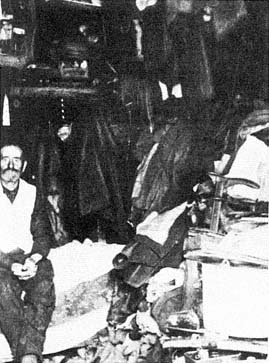Pathological Proximities and Isolation
Another, less visible hazard of hotel life, according to critics, was its potential for leading to a life of crime. Reformers saw this risk particularly in cheap lodging houses, where young people might mix with the most hardened criminals. The chief of New York's secret police branded the laborers' hotels of the Bowery as "nurseries of crime." He claimed that the peril peaked when a young man was nearly broke and he checked into a 15-cent lodging house:
[The young man is then] ready for the tempter whom he finds waiting for him there, reinforced by the contingent of ex-convicts returning from the prisons after having served out their sentences for robbery or theft. . . . In nine cases out of ten, he turns out a thief, or a burglar, if indeed, he does not sooner or later become a murderer.[57]
To his credit, the police chief saw lack of work as the root cause of this progression, but this was lost in related discussions. In a conversation with Riis, a New York police court justice vowed that the 10-cent lodging houses more than counterbalanced "the good done by the free reading room, lectures, and all other agencies of reform." He continued that "such lodging houses have caused more destitution, more beggary and crime than any other agency" he knew.[58] In the twentieth century, Los Angeles police routinely searched for law offenders in the cheap hotels

Figure 7.12
Suspicious isolation and improper material life.
The caption for this photograph in the 1919
report of California's Commission on Immigration
and Housing read, "Is the housing problem
merely a problem of houses ? Can we expect
this man to be 100 percent American?"
and rooming houses near the railroad station. Raymond Chandler's detective character, Philip Marlowe, repeatedly visited hotels "whose clerks were 'half watchdog and half pander' and where nobody except Smith or Jones signed the register."[59]
A different but also negative side to the illicit adjacency of hotel life was the friendless life also possible there: the painful isolation for those who did not want to be alone, or those who were pathologically withdrawing from human company (fig. 7.12). According to one hotel resident, a hotel filled with people having fun could be "the most lonely place in the world." Rooming house residents with no friends in the area could write poignantly about the "cramped and awful loneliness of a hall bedroom." Young people who did not frequent dance halls or lively cafés but passed them frequently were constantly reminded of their own solitude.[60]
Zorbaugh—whose personal loneliness during his Chicago fieldwork added to his sharp distaste for hotel life—said that hotels carried individualization "to the extreme of personal and social disorganization." Rooming houses "were a world of atomized individuals, or spiritual nomads."[61] As proof, Zorbaugh presented the following statement
of a young rooming house woman who had moved to Chicago from Emporia, Kansas, for fervent but futile study as a violinist:
One gets to know few people in a rooming-house, for there are constant comings and goings, and there is little chance to get acquainted if one wished. . . . There were occasional little dramas—as when a baby was found in the alley, and when the woman in the "third floor back" took poison after a quarrel with her husband . . . when the halls and the bathrooms were the scenes of a few minutes' hurried and curious gossip. But the next day these same people would hurry past each other on the stairs without speaking.[62]
Whether or not single-room housing caused such isolation, lonesomeness was part of the territory.
Frequently published reports of suicides kept vivid the public image of pathological isolation in hotels and rooming houses. One hotel manager explained that after gaslights and gas heaters became standard equipment, suicide in hotel rooms was more common; suicide with gas was easier than using a gun or a razor blade.[63] Dozens of novelists set suicides in single-room housing. Hurstwood, the erstwhile husband in Dreiser's Sister Carrie , lives his last months in cheap rooming houses where he "toils up" the inevitable "creaky stairs." In a tiny room with gas jets "almost prearranged" for what he intends, he eventually kills himself with a final antisocial phrase, "What's the use?"[64]